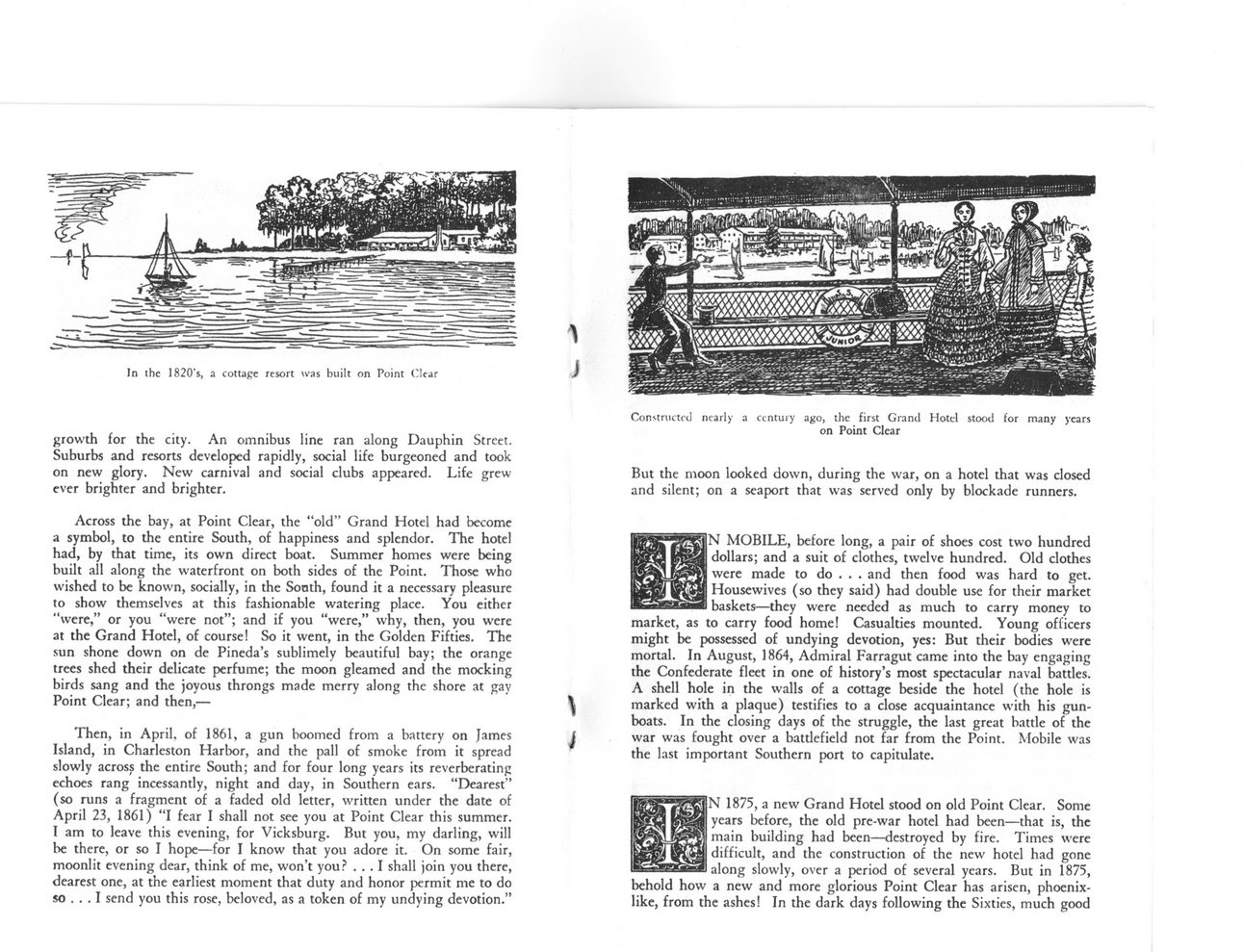This text was obtained via automated optical character recognition.
It has not been edited and may therefore contain several errors.
In the 1820?s, a cottage resort was built on Point Clear growth for the city. An omnibus line ran along Dauphin Street. Suburbs and resorts developed rapidly, social life burgeoned and took on new glory. New carnival and social clubs appeared. Life grew ever brighter and brighter. Across the bay, at Point Clear, the ?old? Grand Hotel had become a symbol, to the entire South, of happiness and splendor. The hotel had, by that time, its own direct boat. Summer homes were being built all along the waterfront on both sides of the Point. Those who wished to be known, socially, in the South, found it a necessary pleasure to show themselves at this fashionable watering place. You either ?were,? or you ?were not?; and if you ?were,? why, then, you were at the Grand Hotel, of course! So it went, in the Golden Fifties. The sun shone down on de Pineda?s sublimely beautiful bay; the orange trees shed their delicate perfume; the moon gleamed and the mocking birds sang and the joyous throngs made merry along the shore at gay Point Clear; and then,? Then, in April, of 1861, a gun boomed from a battery on James Island, in Charleston Harbor, and the pall of smoke from it spread slowly across the entire South; and for four long years its reverberating echoes rang incessantly, night and day, in Southern ears. ?Dearest? (so runs a fragment of a faded old letter, written under the date of April 23, 1861) ?I fear I shall not see you at Point Clear this summer. I am to leave this evening, for Vicksburg. But you, my darling, will be there, or so I hope?for I know that you adore it. On some fair, moonlit evening dear, think of me, won?t you? ... I shall join you there, dearest one, at the earliest moment that duty and honor permit me to do so ... I send you this rose, beloved, as a token of my undying devotion.? Constructed nearly a ccntury ago, the first Grand Hotel stood for many years on Point Clear But the moon looked down, during the war, on a hotel that was closed and silent; on a seaport that was served only by blockade runners. N MOBILE, before long, a pair of shoes cost two hundred dollars; and a suit of clothes, twelve hundred. Old clothes were made to do . . . and then food was hard to get. Housewives (so they said) had double use for their market baskets?they were needed as much to carry money to market, as to carry food home! Casualties mounted. Young officers might be possessed of undying devotion, yes: But their bodies were mortal. In August, 1864, Admiral Farragut came into the bay engaging the Confederate fleet in one of history?s most spectacular naval battles. A shell hole in the walls of a cottage beside the hotel (the hole is marked with a plaque) testifies to a close acquaintance with his gunboats. In the closing days of the struggle, the last great battle of the war was fought over a batdefield not far from the Point. Mobile was the last important Southern port to capitulate. N 1875, a new Grand Hotel stood on old Point Clear. Some years before, the old pre-war hotel had been?that is, the main building had been?destroyed by fire. Times were difficult, and the construction of the new hotel had gone along slowly, over a period of several years. But in 1875, behold how a new and more glorious Point Clear has arisen, phoenixlike, from the ashes! In the dark days following the Sixties, much good

Alabama Point-Clear-Cavalcade-07